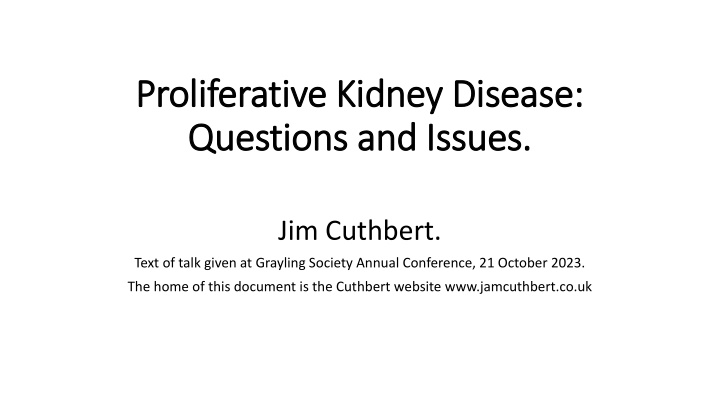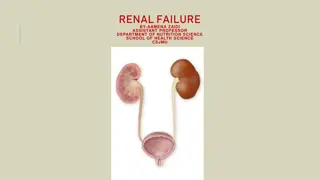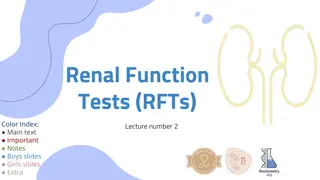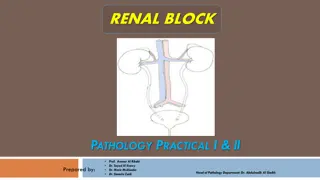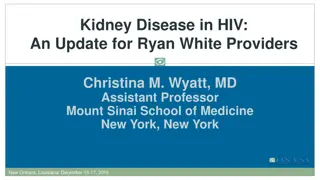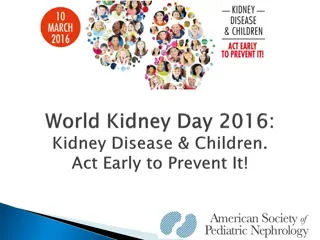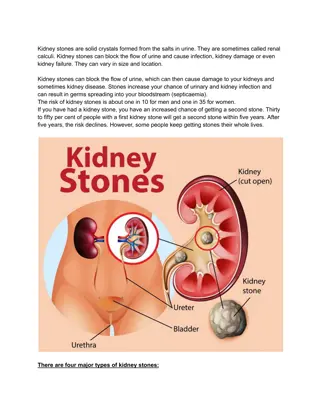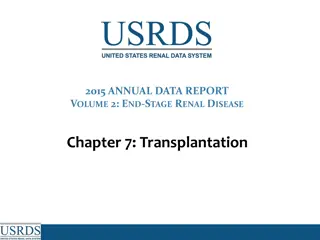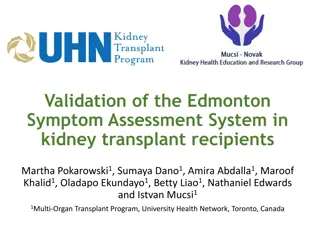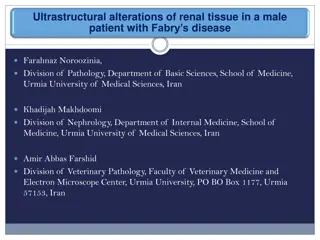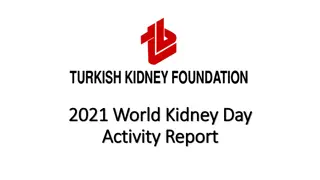Proliferative Kidney Disease: Questions and Issues
Proliferative Kidney Disease (PKD) is a concerning issue affecting salmonid fish stocks in the UK. Explore the causes, effects, and interactions with factors like pollution and climate change. Discover why authorities' policies on PKD remain unclear and what actions can address this prominent challenge.
Download Presentation

Please find below an Image/Link to download the presentation.
The content on the website is provided AS IS for your information and personal use only. It may not be sold, licensed, or shared on other websites without obtaining consent from the author.If you encounter any issues during the download, it is possible that the publisher has removed the file from their server.
You are allowed to download the files provided on this website for personal or commercial use, subject to the condition that they are used lawfully. All files are the property of their respective owners.
The content on the website is provided AS IS for your information and personal use only. It may not be sold, licensed, or shared on other websites without obtaining consent from the author.
E N D
Presentation Transcript
Proliferative Kidney Disease: Proliferative Kidney Disease: Questions and Issues. Questions and Issues. Jim Cuthbert. Text of talk given at Grayling Society Annual Conference, 21 October 2023. The home of this document is the Cuthbert website www.jamcuthbert.co.uk
This talk is really about three questions. This talk is really about three questions. Is PKD a major cause of the observed decline in salmonid fish stocks in the UK? If so, what can be done? Why have the authorities in the UK adopted policies on PKD which, as we will see, effectively amount to inaction, and looking the other way?
What is PKD? What is PKD? PKD is caused by a microscopic parasite, known to its friends as Tetracapsuloides bryosalmonae. This parasite causes inflammation in the kidneys of infected fish. The parasite has a complicated lifecycle: it cycles between two host species: namely, salmonid fish, and an invertebrate animal known as a bryozoan. Infected fish will either die, or recover. If they recover, they will continue to secrete the parasite into the water.
What about bryozoans? What about bryozoans? These are a form of freshwater corals, which grow in colonies in suitable locations. They are widespread throughout the UK. They thrive if the water is polluted, for example, through sewage pollution, or if the water is subject to eutrophication. They apparently prefer certain locations, where they have some shelter from strong currents, but are not liable to be buried in sediment. A classic location is on exposed tree roots.
What are the effects of PKD? What are the effects of PKD? PKD can sometimes cause obvious, and devastating, fish kills. This happens mainly in fish farms: but occasionally in wild fish. For example, Yellowstone in 2016. Where PKD is endemic, it seems to primarily affect juvenile fish: i.e., in their first year of age. Mortality in this age group may well go unnoticed. So PKD could be present in a river, and potentially causing a long run decline in fish stocks, without giving any overt sign of its presence.
PKD interacts with other factors. PKD interacts with other factors. Anything which stresses fish, like pollution, or other diseases, is likely to increase mortality if fish become infected with PKD. Global warming is a particular threat: increased water temperatures stress fish directly, and also lead to more parasites being released into the water by infected bryozoa. And, as noted, pollution increases bryozoan numbers, and hence the number of parasites.
How widespread is PKD? How widespread is PKD? Endemic and widespread on the Continent, and North America. Northern latitudes are no protection. For example, PKD was detected in over 70% of 91 salmon rivers studied in Norway. Likely to be endemic and widespread in the UK: e.g., it is likely that the parasite that causes PKD is endemic in Scotland and is likely to be widespread [Marine Scotland, July 2022] The disease is endemic to UK [DEFRA, April 2022] But the precise distribution in the UK is not known, and no-one seems to be seriously trying to establish this.
Key Factual Question: 1 Key Factual Question: 1 Is PKD playing a major role in the decline in salmonid fish stocks in the UK? Given the research on the continent, and the fact that PKD is widespread here, there must be a strong possibility that this is the case. But this is a question which urgently needs to be definitively settled.
Key Factual Question: 2 Key Factual Question: 2 What is the precise distribution of PKD in the UK? This is not just a question of which catchments are affected: but whether there are areas within catchments which are currently clear: and of determining what types river condition are associated with low or high parasite burdens.
Key Factual Question: 3 Key Factual Question: 3 What are the implications of the fact that there are different sub types of the PKD parasite? The PKD parasite has a number of different sub-types: e.g., North American and native European varieties. The view has been expressed that the North American variety is relatively more lethal to native European fish. Is this correct? And what are the distributions within the UK of the different parasite types?
Key Factual Question: 4 Key Factual Question: 4 What are the implications of the practice that some fish farms have developed, of deliberately infecting their stocks with PKD at a time of year when they are likely to recover? Even when these fish no longer show clinical symptoms, they will still shed parasite spores. So what effect has this practice had on spreading PKD: or on spreading different varieties of the parasite?
Key Factual Question: 5 Key Factual Question: 5 What types of river condition favour the Bryozoan host? It is already known that sewage pollution, and water eutrophication, cause bryozoans to proliferate. But what other factors contribute to their prevalence?
What should be done? What should be done? A first priority, clearly, should be to get answers to the above factual questions. Eradication of PKD may well be impossible. But, if we knew the answers to the above questions, we might well be able to devise ameliorative strategies. For example, through pollution control, or habitat alteration. And another advantage of better knowledge is that it could help us avoid, or modify, policies which might have unintended adverse consequences.
But there is a fundamental stumbling block. But there is a fundamental stumbling block. Namely, that official bodies in the UK have adopted a policy of inaction, and looking the other way on PKD. As we will see, their official statements are actually inconsistent with what their own funded research shows.
Lets look first of all at findings from a publically Let s look first of all at findings from a publically commissioned research report. commissioned research report. The next slide looks at some findings from the following research paper, published in 2011, and funded by, among others, the Natural Environment Research Council, the Biotechnology and Biological Sciences Research Council, and the Department for Environment, Food and Rural Affairs. Life cycle complexity, environmental change, and the emerging status of salmon proliferative kidney disease : Okamura, Hartikainen, Schmidt-Posthaus and Wahli: Freshwater Biology, (2011), vol 56, pp735-753. (available free online at a site called semantic scholar )
Relevant points from Okamura paper. Relevant points from Okamura paper. PKD is a widespread disease of wild and farmed fish in the Northern Hemisphere. Juvenile fish are regarded as most at risk from PKD, but any fish which have not been previously exposed are vulnerable. The disease related mortality in wild stocks is almost certainly underestimated. The impact of PKD on fish populations is poorly understood. But evidence from Switzerland, the U.S. and Norway suggests it is playing a significant role in fish declines. Infected fish will remain infective for an extended period, perhaps indefinitely in some cases. There is evidence that sewage pollution, and eutrophication more generally, increase both bryozoa and parasite levels.
In contrast, the official position is: In contrast, the official position is:- - Despite this clear evidence available from officially funded research in 2011, the official position on PKD includes the following. the affected species (salmonids; both farmed and wild) produce non- infectious (non-virulent, non-viable) spores. [letter from Directorate for Marine Scotland, March 2022. This view later essentially retracted.] the incidence of PKD in wild and farmed populations in Scotland is very low. [letter from Marine Scotland, April 2022. This statement based on Marine Scotland s policy of indirect surveillance for PKD. Modified in later correspondence to clinical manifestation of PKD in salmonids is extremely low. ]
Official position, continued. Official position, continued. PKD does not cause significant issues to the trout, salmon or wild sectors. [letter from Directorate for Marine Scotland, July 2022]. Despite saying, in the same letter, as we have seen, that the parasite that causes PKD is likely to be endemic and widespread in Scotland. And finally Based on our current knowledge, we do not envisage that a policy review in this area will be taken forward. [letter from Marine Scotland Policy Directorate, October 2022.]
More on official position: DEFRA More on official position: DEFRA The DEFRA position is similar. Specific consideration was not given to the possible effects of the practice of deliberately exposing young stock to PKD. [letter from DEFRA, April 2022]. There is currently no active surveillance of PKD in wild or farmed fish. [same letter] There is no evidence that the presence of farmed stocks increases the intensity of infection in the wild. [letter from DEFRA, March 2023] There is currently no cause to conduct a review into any aspect of PKD policy in England. This position will be reviewed should new information come to light. [same letter]
Rationally, the official position makes no sense. Rationally, the official position makes no sense. It is common ground that we have suffered widespread and drastic declines in wild salmonid populations. It is also common ground, (now), that PKD is endemic and widespread in the UK. An authoritative research report, commissioned by UK public bodies, indicates that PKD is highly likely to be a major contributor to salmonid population declines on the continent. And yet our authorities adopt a policy of inaction, and a policy of indirect surveillance which their own commissioned research indicates is likely to underestimate PKD related mortality. And then say they won t review the position until there is more evidence.
Nevertheless, there may be a twisted logic to the Nevertheless, there may be a twisted logic to the official position. official position. From the point of view of certain sectional interests, there may be perceived benefits from a policy of inaction on PKD. This could be true, as I will explain, for:- The fish farming industry. DEFRA and Marine Scotland themselves. The wider government. Commercial angling interests.
Which raises the question. Which raises the question. Who is looking after the interests of the PBGTA community? (Poor Bloody Grayling and (wild) Trout Angling community.)
So, finally, going back to the three initial questions. So, finally, going back to the three initial questions. Is PKD a major cause of the observed decline in salmonid fish stocks in the UK? Quite possibly: indeed, probably. If so, what can be done? Unclear if there is a solution: but the starting point is obtaining much better information on some key questions. Why have the authorities in the UK adopted policies on PKD which effectively amount to inaction, and looking the other way? Not knowable with certainty: but a suspicion they are adopting a course of least resistance, and trying to keep too many vested interests happy. Progress is unlikely unless there is a body with a clear focus on the interests of the wild fish community.
